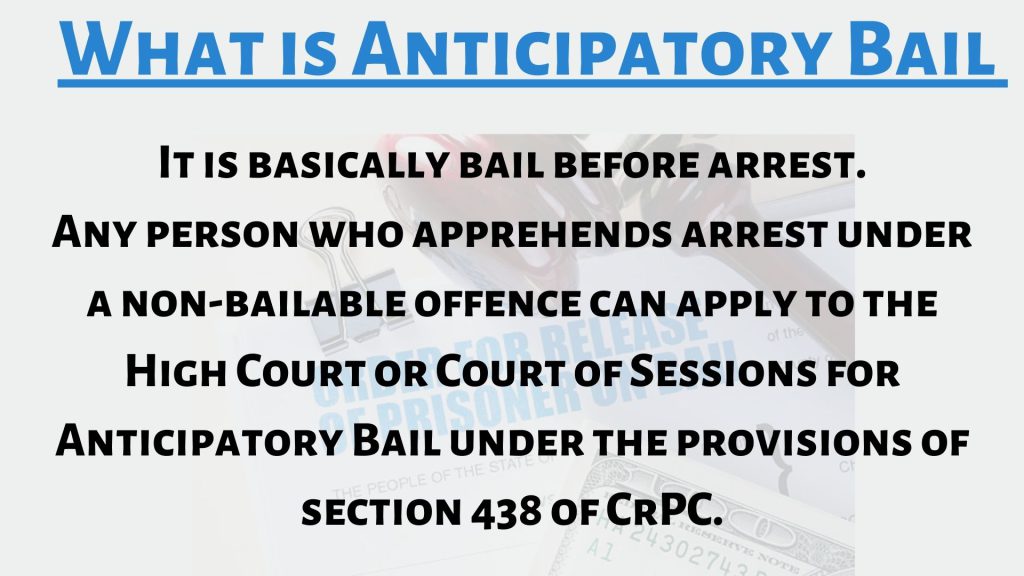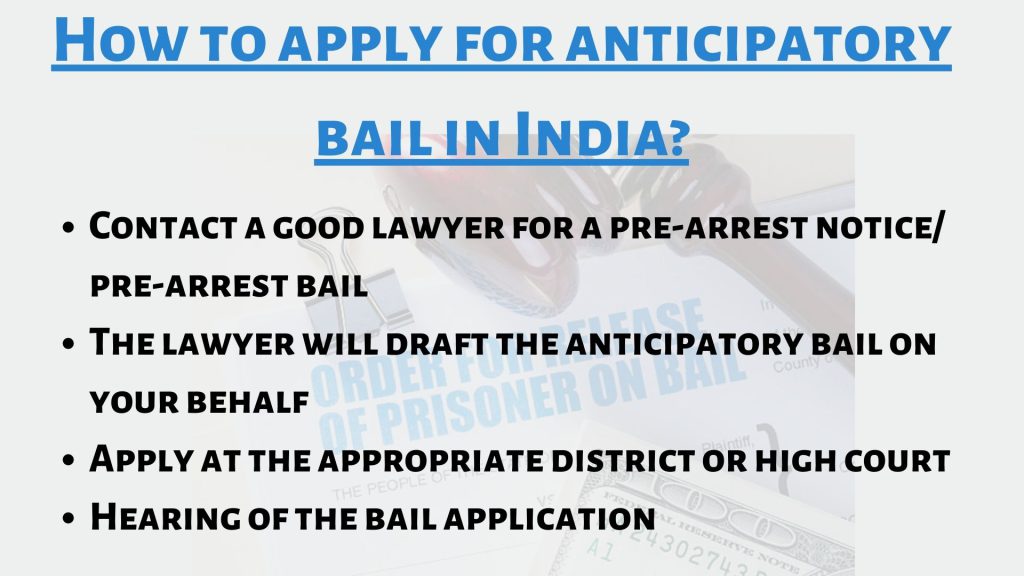Introduction
Whenever any criminal offence is charged against any person the first thing that comes to his/her mind is the fear of arrest. In cases like these anticipatory bail comes into play.
In this article, you will read about the laws related to anticipatory bail in India, its procedure, validity, and what if it gets rejected in the court.
Keep reading to know more about anticipatory bail.
What is anticipatory bail in India?

As the name suggests anticipatory means doing something beforehand. So in a very simple language, anticipatory bail means applying for bail before the person has been arrested.
When the accused is sure that he/she is going to be arrested soon then the application for anticipatory bail is filed.
The law governing regular bail and anticipatory bail has been dealt with under the Code of Criminal Procedure, 1908 (CrPC). Sections 437 and 438 of the Code talks about regular bail, whereas, section 438 of the Code deals with the concept of anticipatory bail. Read on to know more about regular bail and anticipatory bail.
Suggested Reading: How to get bail in India?
How to apply for anticipatory bail in India?

Here are the steps that you need to follow in order to apply for an anticipatory bail in India.
- Contact a good lawyer for a pre-arrest notice/ pre-arrest bail
It is important to contact a good lawyer once an FIR or criminal complaint has been lodged against you. Once you engage a lawyer, a suitable course of action could be taken from the lawyer’s side. The lawyer can then file for an application of pre-arrest notice or pre-arrest bail.
- The lawyer will draft the anticipatory bail on your behalf
The lawyers after discussing all the points with you will draft an application for an anticipatory bail stating all the legal points as to why the bail should be granted to you.
- Apply at the appropriate district or high court
Once the draft is completely ready, your lawyer will file it to the appropriate session court.
- Hearing of the bail application
When the case comes up for hearing, your lawyer will present the case in front of the judge. If the judge finds your case suitable for granting the bail, your bail will be granted.
If your anticipatory bail gets rejected in the session court, it may be further filed in the high court and then to the supreme court.
Procedure for Anticipatory Bail in India
The procedure to proceed with an anticipatory bail depends upon two conditions which are as discussed below.
- When FIR is not filed
- The first step is that the public prosecutor will talk to the police officer who is in charge.
- Since no FIR has been filed, so in the view of the public prosecutor there is no ground for filing the anticipatory bail.
- The judge will agree with the view of the public prosecutor and will verbally ask your lawyer to withdraw the anticipatory bail application.
- The lawyer will then make a request orally for seven days pre-arrest notice if in case the police decide to arrest you or your family.
- In all likelihood, the judge will grant the plea.
- An order will be granted called ‘notice bail’.
- If your bail gets rejected in the lower court you can apply in the high court.
- If your bail gets rejected by the high court, then you can apply for it in the honorable supreme court.
- When FIR is filed
- In the cases when the FIR is filed, the police will send the notice of arrest to your house.
- As soon as you receive this arrest notice, contact your lawyer and the application will be moved to the court in the same way as stated above.
When can the court grant the anticipatory bail?
The court will consider the following factors while granting anticipatory bail.
- No custodial interrogation of the accused is required.
- There should be no pending cases on the accused.
- No recovery is to be affected by the accused.
- If arresting the accused will malign his reputation in the society.
- The crime done is not of serious or grave nature.
- No prima-facie case is made out against the alleged accused.
- The accused is not likely to abscond from the country
- The Accused will not interfere in the investigation work of the police.
- The accused will fully cooperate with all the police officers and the investigating agencies.
- The accused person will not tamper with any evidence that can be used against him by the prosecution.
Validity of an anticipatory bail
Generally, the court grants anticipatory bail for a period of 30 days and after the period of 30 days, one needs to apply for regular bail. Although, if the accused is arrested, he must produce his anticipatory bail and also file for regular bail during the stipulated time of the anticipatory bail. Once the stipulated time expires, the accused must file for an extension of the anticipatory bail or a fresh application may be made.
How long does anticipatory bail take?
It may take around 7 to 15 days for a court to conclude whether or not you will get an anticipatory bail or not. The decision completely remains on the understanding of the court. The court looks into several factors like the nature of the crime, past conduct of the accused, etc. All the factors are already discussed above in detail.
Cost of an Anticipatory Bail
In criminal cases, the cost of the bail depends upon the seriousness of the case involved. The total cost involved is the cost imposed by the court in furnishing the bail bonds and the cost of the lawyer. Usually, for criminal cases of low seriousness, a standard amount is fixed as per the conventional practice of the court which is required to be submitted in the court for the bail to be granted. However, the court may decide this amount on its own understanding depending on the facts of the case.
Under which conditions does the anticipatory bail gets denied
Here are the following conditions under which the anticipatory bail gets denied.
- If the accused is found to commit a similar crime during the period of bail.
- If the accused is found to tamper with the pieces of evidence.
- If the accused does not present in the court when called and has absconded.
- When the accused creates problems for the society and disturbs the law and order after release on bail.
- If the life of the accused is in danger after release.
- When it is alleged that the person on bail is terrorizing the witness and committing violence against the police.
- When it is found that there was a wrong exercise of judicial discretion to grant the accused the anticipatory bail.
- When the circumstances proved that the accused has misused the liberty granted to him, it is sufficient ground to cancel the bail.
Conclusion
Being charged with a criminal offense whether big or small can have serious effects on you and your life. You could suffer job loss, relationship loss, a criminal record against you, and of course jail. It’s not easy to get rid of it easily. So it is a good idea to include a good criminal lawyer who can help you with their legal knowledge and experience.
I hope this article would have helped you in some or the other way. If you need more information regarding information on bail matters, do visit our website.
